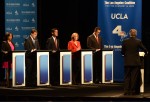Five Los Angeles mayoral candidates faced off in Royce Hall Monday night to discuss their stance on issues such as education and local economy – one in a series of debates leading up to the mayoral election on March 5.
To be elected mayor, a candidate must win at least 50 percent of the vote. If none of the contenders win at least 50 percent, the top two candidates will compete in a runoff election on May 21.
City Councilman Eric Garcetti, City Controller Wendy Greuel, attorney and radio talk show host Kevin James, City Councilwoman Jan Perry and technology executive Emanuel Pleitez participated in Monday’s debate.
The debate was co-hosted by UCLA, NBC4 and the Los Angeles Coalition for the Economy & Jobs. It was similar to a forum, where candidates responded to questions from three panelists and a moderator in front of an audience of about a thousand people.
NBC4 chief political reporter Conan Nolan moderated the debate, along with the panelists including Frank Gilliam, dean of the Luskin School of Public Affairs. The debate began with a focus on the local economy.
Jan Perry said she would require a labor project agreement that would put people back to work and set aside a portion of jobs for no-skilled, low-skilled and homeless people, as well as those with nonprofit and vocational training.
All of the candidates said they would invest in vocational training, though Garcetti was the only candidate who gave a specific example of how he would ease vocational training for job-seekers.
Garcetti proposed creating an electronic application process for L.A. residents to apply for job training. He compared the idea to the application process for the University of California, where students can submit one application to different UC campuses.
Greuel emphasized the importance of keeping college students in Los Angeles after they graduate, so that they can create hubs of economic activity. This could be accomplished through incentivizing Los Angeles as a place of business, and actively recruiting college students.
James also brought up tax reform as a way to encourage small businesses, as well as incentivizing the permitting process of small businesses.
The panelists then shifted the focus of the debate to other topics, such as education and transportation. Pleitez and Perry said primary education should involve the entire family, much like a community center, instead of just the student.
Garcetti and Greuel said they would fight to restore state funding for school programs like art departments that went through budget cuts during the recent recession.
Most of the candidates were divided in the methods they would use to increase Los Angeles transportation, though they agreed on its importance in the city.
Michael Dukakis, former governor of Massachusetts and a visiting professor of public policy at UCLA, said he is more familiar with Garcetti, Greuel and Perry than the other candidates in the debate because they seem to be the strongest contenders in the mayoral race.
“There are very good candidates, who all basically agree on what the city needs,” he said. “They are philosophically the same and have good track records in public life.”
Frank Gilliam said he felt the candidates were more specific on their plans than they had been in previous debates, though their answers still contained rhetoric.
He added that Monday’s debate highlighted the strengths and experience of certain candidates compared to the others.
“Garcetti, Greuel and Perry are starting to pull away from the pack. Now, it’s a question of who will make the runoff,” he said.
Abigail Cooke, a graduate student in the geography department, said she attended the debate to learn more about the candidates.
As a Los Angeles resident, she said she feels the mayoral race is important because students are not isolated from the politics of the city.
“These choices affect our lives and the lives of residents,” she said.
